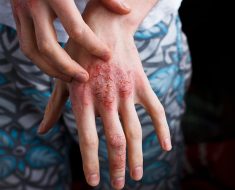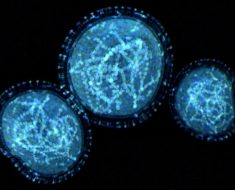
In most people, norovirus causes a few days of misery spent in the bathroom and then is quickly forgotten. Epstein-Barr virus can pass without any indication at all. And many people shrug off COVID-19.
But a growing body of research suggests that in some unlucky few, the immune system overreacts to these seemingly minor insults, leaving years or even a lifetime of symptoms.
“The wrong genetics with the wrong infection at the wrong time,” explained Dr. Judith James, a rheumatologist and vice president of clinical affairs at the Oklahoma Medical Research Foundation. “I do think we have mounting evidence that means people should have this on their radar.”
It’s long been suspected that seemingly simple infections can leave a lasting imprint.
New research found a likely connection between a bout of norovirus, more commonly known as the stomach bug and Crohn’s disease, a long-lasting inflammatory bowel condition.
Other recent studies have blamed an Epstein-Barr infection on later multiple sclerosis.
And as many as 10% to 30% of people who catch COVID-19 have symptoms that linger for months to years.
Usually, a trigger occurs when a bug or drug looks to the immune system like one’s own cells or tissues, said Dr. Raymond Chung, a liver specialist at Massachusetts General Hospital and Harvard Medical School. This mimicry spurs a response, and then the response perpetuates the problem.
Understanding how that cycle gets started and then is reinforced could lead to treatments, Chung said.
“If we could really catalog those steps, then I think we would be in a better position to think about interruption of the cascade,” he said. Carefully dialing down the response will be key, he said, because broadly blocking the immune reaction “could lead to unintended consequences.”
Even if people can’t avoid everyday pathogens, it’s important to identify the connections between them and long-term consequences, Chung said.
“Knowledge is power,” he said. “It’s really for us to understand our own predispositions to these kind of exaggerated, aberrant responses—but it will take time.”
Short-term illness, long-term misery
For decades, researchers have believed that infections and insults could lead to long-term problems.
Chickenpox is known to reappear later in life as shingles, an extremely painful nerve disorder. The 1918 flu led some people to develop Parkinson’s disease. A human papillomavirus infection can lead to cancer years later. And it’s long been thought that chronic fatigue syndrome must result from some kind of infection.
But solid scientific evidence has been accumulating only in recent years, said Mark Davis, who directs the Stanford Institute for Immunity, Transplantation and Infection.
The mapping of both the human and mouse genomes have helped researchers understand the role of immune system genes at a deeper level, he said.
The research on norovirus used a mouse given the same genetic mutation often connected with intestinal disease. When infected with norovirus, the mouse’s immune system made T cells that damaged the gut, as expected. But it also prevented T cells from releasing a protective factor that would otherwise restore the gut. So, the mouse was less able to recover from the infection.
Although it’s tough to prove the same thing happens in people, the study provides a plausible explanation for this infection-disease connection, said the paper’s senior author, Ken Cadwell, who studies how viruses interact with the immune system, at the New York University Grossman School of Medicine.
On its own, the stomach bug is usually “inconsequential,” said Dr. John Wherry, who directs the Institute for Immunology at the Perelman School of Medicine at the University of Pennsylvania. Some number of people have a genetic mutation that on its own is equally inconsequential. But when someone with a seemingly inconsequential mutation gets a seemingly inconsequential infection, it can disrupt the balance of bugs that live in their gut, leading to bowel disease.
It’s been hard to prove this sequence of events, because the virus is gone by the time symptoms appear. Researchers have known that the gut microbe balance was out of whack, but it wasn’t shown until this new study that the instigator was a simple infection, he said.
“It’s a trifecta combination,” Wherry said. “This is like a real ecosystem.”
Why are some people more vulnerable?
Genetics are a key factor in this disease cascade.
But figuring out which genes cause vulnerability to which infections is no easy task.
“There are many diseases and each one is going to have a different set of molecules in play,” Davis said.
Overall, about 1 in 12 people will develop an autoimmune condition over the course of their lifetime, James said.
Young adult women are known to be particularly vulnerable to autoimmune diseases, though no one knows exactly why.
“Women often have slightly stronger immune responses, and that’s more noticeable during those child-bearing ages,” she said. Hormones may play a role, but don’t fully explain the difference. “We don’t have all the answers.”
Anyone with an autoimmune disease in the family has a higher risk of developing an autoimmune disease themselves, James said. Identical twins, though, might or might not get an autoimmune disease if their twin does, or might develop it decades later. Autoimmune diseases can also be “sporadic,” cropping up without any obvious familial link.
It’s known that siblings of children with Type 1 diabetes are at higher risk for the disease themselves. So efforts are underway to understand their common genetics and track changes to the siblings’ immune systems “before disease even develops,” James said.
Because these conditions rarely start at birth, there’s likely some kind of a tipping point that happens later on in life, such as an infection, James said: “Maybe you need either a lot of genetics and a little infection or a lot of infection and some of the genetics.”
Rather than identifying most people as high risk, it might be easier to quickly see when someone’s immune system is over-reacting to an insult like an infection, she said.
“Could we just dial it back just a little bit,” or prevention progression, she wonders.
Although these long-term symptoms might be an individual thing “between a particular bug, a particular person and maybe a particular moment in time,” there are common mechanisms across these conditions, Davis said. Hopefully, that means scientists will eventually learn how to exploit these mechanisms to develop treatments.
“It’s becoming more and more clear how these diseases got started,” Davis said. “What isn’t clear is why they persist in particular people. Why doesn’t the system come back in balance again?”
Figuring that out and curing disease, “that’s the next chapter in all of this,” he said.
Can you protect yourself?
Davis desperately wants to develop a test that identifies struggling immune systems, the way a cholesterol test indicates brewing heart trouble.
“As an immunologist, I feel embarrassed” there isn’t one, he said.
Davis scoffs at commercial “immune boosters,” saying that at best they merely separate people from their money, and at worst they might be harmful.
Living in a bubble isn’t the answer, Chung said. In recent years, research has shown, for instance, that overprotecting children by avoiding allergens early in life may actually increase the risk of allergies later in life.
What’s really needed is for researchers to understand what makes someone more vulnerable to long-term consequences from infections, Chung said: “Part of that is genetics. But part of that may also be understanding what your immune profile might be at any given moment in time. We can then ask, is this problematic? Is this a risk signature?”
A healthy lifestyle—getting sufficient sleep, avoiding cigarettes and too much alcohol and eating a healthy diet—are all important for protecting the immune system, James and others said.
Mounting evidence suggests that the microbiome—the bugs that live on and in everyone’s body—can influence the immune system. But it’s still too early to know what can be done to boost immune health through the microbiome, James said.
Though there’s little people can do to understand their own risk, researchers say it doesn’t make sense to panic.
“I’m not one to get hysterical about these things,” Wherry said. “Infections and microbes are part of our world, part of our life, part of a lifespan.”
Instead, it makes sense to make simple behavior changes, like washing hands frequently, wearing a mask in a busy airport and staying home rather than powering through an illness, he said.
Source: Read Full Article





